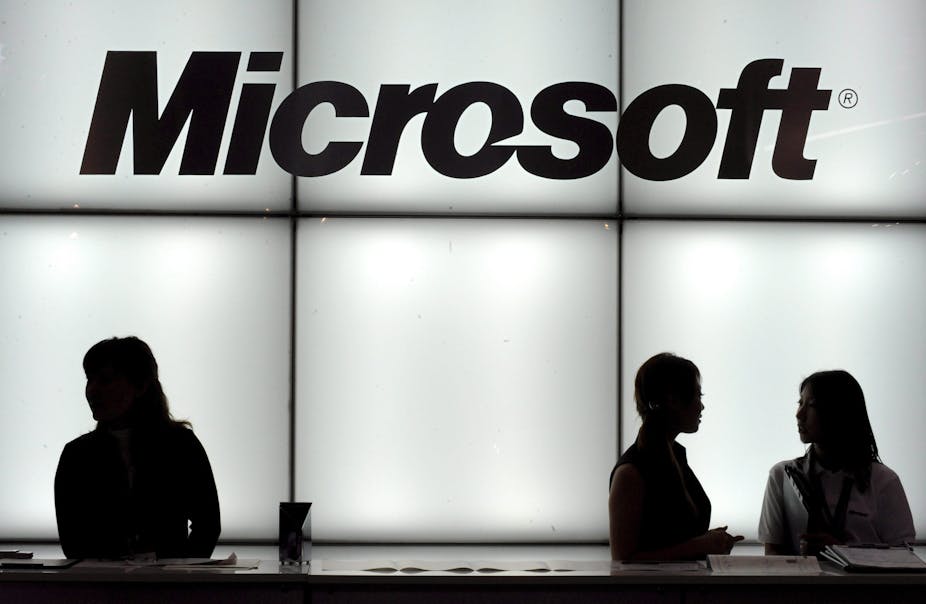You can tell a lot about an organisation’s culture and view of the world by looking at what it says about its competitors.
Some enterprises, just like some politicians and academics, are serene. They don’t engage with the trolls. They don’t badmouth their rivals, either because they are confident or because visceral criticism is bad corporate manners. They don’t shout.
Others signal that they are in trouble by denigrating their competitors. Microsoft’s current anti-Google advertising campaign in the US raises questions about where Microsoft is going and about regulation of “negative campaigning”.
Microsoft and Google are increasingly operating in the same markets. Both have hardware arms and licensing deals, both offer network services, both have search engine services, both offer browsers, both have been criticised for disregard of privacy concerns.
This year Microsoft has been running a series of advertisements warning consumers in the US that Google doesn’t care about their privacy. The denigration is presumably meant to erode Google’s “do no evil” persona and encourage regulators to crimp its growth, particularly in Europe where Google has thumbed its nose at privacy watchdogs.
The campaign reflects the US market’s tradition of astroturfing and pitbull “attack” advertising, the same “knock-em-out” ads apparent in US elections featuring claims that candidates are keen on terrorists, child-molesters, murderers and other hate figures. The ads haven’t figured in Europe, arguably because of consumer distaste rather than stronger regulation.
It is unclear whether we’ll see such ads in Australia. It is also unclear whether they will hurt Microsoft more than they hurt Google, or whether they are simply a distasteful waste of money.
Australian law emphasises “truth”, not “niceness”
Australian law doesn’t enforce much regulation for attacks on competitors. We rely on self-constraint and weak standards under private sector bodies such as the Advertising Standards Bureau that are concerned with industry self-regulation. Those standards are broadly tied to broadcasting law. They co-exist with constraints under intellectual property and consumer protection law, including rules about the marketing of “supplements” that have recently attracted public attention.
In essence the Australian regime is uneven. It varies by type of product, type of claim and type of medium. It is founded on the willingness of advertisers to abide by their own rules. It is also founded on expectations that informed consumers will use their wallets to punish advertisers, broadcasters and publishers who breach community norms.
The Finkelstein inquiry, the Cash for Comments affair and statements by shockjocks raise questions about those foundations. Reproof by the Press Council for example is equivalent to being flailed with a lettuce leaf. Microsoft is unlikely to quiver if smacked by the Advertising Standards Bureau. And it won’t be punished by ACMA, the broadcasting regulator.
What the ads tell us
Slamming an opponent isn’t out of character for Microsoft, which has a history of pushing the regulatory envelope for behaviour deemed to be anti-competitive. That aggression is one reason for its success. What we’re now seeing are recurrent doubts about Microsoft’s future as the world moves towards cloud computing and away from the traditional PC. Microsoft’s attacks may be intended primarily to reinforce its share price (higher last week despite slow growth in some sectors), given the importance of retaining experts whose remuneration is based on equity rather than the fortnightly pay cheque and being able to acquire innovative startups.
In essence, Microsoft is behaving like a large IT corporation… business as usual.
We might of course want Microsoft and Google to play by different rules. Google’s underpinned its growth through its underdog image and ‘do no evil’ rhetoric. The attack ads are a reminder of reality: two very large corporations whose continuing success and existence are not guaranteed.
Does playing nicely work?
One foundation of commercial success is trust. That trust may dissipate if consumers perceive the campaigning as symptomatic of ruthless corporations and pots calling kettles black.
Just as importantly, badmouthing can boomerang. Microsoft does not have a great reputation for customer care. It has been criticised for a disregard of consumer privacy. Highlighting problems at Google won’t erase consumer (and regulator) suspicions about Microsoft’s performance.
We could establish legal frameworks to protect corporate reputation, similar to protection under defamation law. They are open to abuse and should be avoided. We might instead rely on consumers. Unhappy with statements by a corporation – or by the attention-seeking Mr Jones? Express your unhappiness to its board. Importantly, shape corporate behaviour by depriving offenders of your dollars. Don’t listen to Jones. Don’t buy the products. Wallets can persuade offenders to “play nicely”.
Mum’s advice about getting on with other kids is a better solution than new law or a toothless non-government “truth in advertising” regulator.

